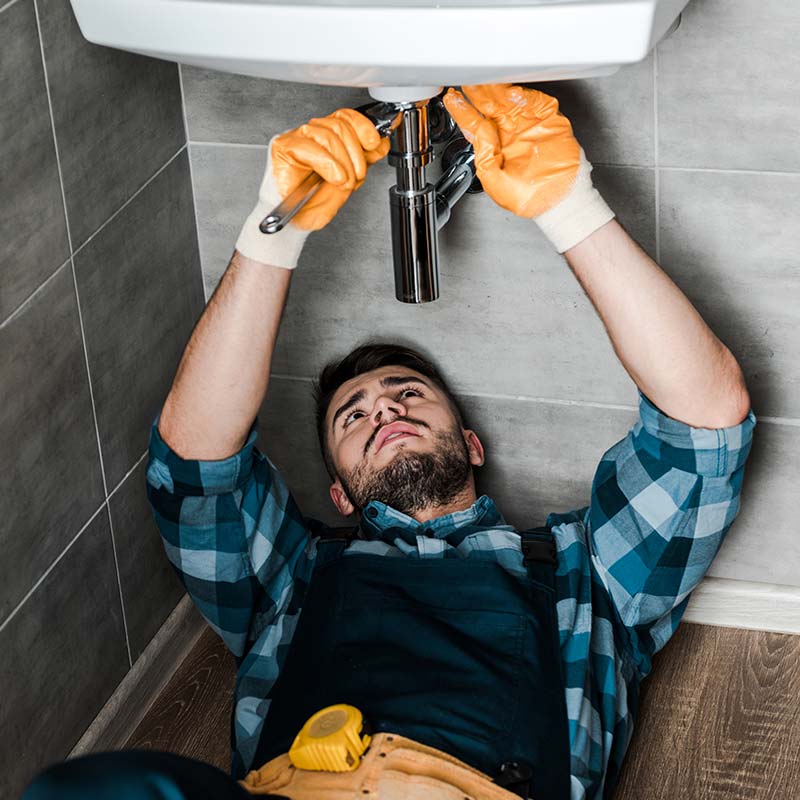A blocked drain can be a major hassle, causing unpleasant odors and potential water damage. The best way to deal with a blocked drain is to address the issue as soon as you notice it. Ignoring it can lead to bigger problems, like backed-up water or damaged pipes.
Common causes of blocked drains include hair, grease, and small objects that accidentally go down the drain. Understanding what typically causes blockages can help you prevent them. Regularly cleaning your drains and being mindful of what goes down can save you both time and money.
In case of a blockage, specific tools and methods can help clear up the issue. Using a plunger, a plumber’s snake, or even a homemade solution of baking soda and vinegar can often do the trick. If the blockage persists, it may be time to call in a professional plumber.
Understanding Blocked Drains
Blocked drains can cause a lot of trouble in homes and businesses. It’s important to recognize the causes and signs to address issues quickly.
Common Causes of Blocked Drains
Many things can block drains.
Hair is a frequent culprit in bathrooms, where strands accumulate and form clumps that prevent water from flowing.
Grease is often a problem in kitchens. When hot grease is poured down the sink, it cools and hardens, forming a blockage inside the pipes.
Foreign objects are another cause. Items like food scraps, soap, and tissues can build up over time.
Tree roots can also invade underground pipes through small cracks, causing significant blockages as they grow inside.
Mineral buildup from hard water can form deposits that narrow pipes over time.
Regular maintenance and being mindful of what goes down the drain can prevent most blockages. Using strainers and not disposing of grease or large items in sinks can help keep drains clear.
Signs of a Blocked Drain
Early signs of a blocked drain include slow draining water in sinks, bathtubs, or showers. If water takes longer than usual to go down, it might be due to a buildup inside the pipe. Unpleasant odors coming from drains can indicate trapped food, grease, or other organic matter decomposing inside.
Gurgling sounds in pipes or sinks when using water can also point to a blockage. These noises occur when water struggles to flow past an obstruction, causing air pockets. Water backups are a more severe sign; when water backs up out of a drain, the blockage is usually significant.
Recognizing these signs early can prevent major problems and costly repairs. Addressing them quickly with appropriate methods, like plungers or calling a professional, can save time and money.
Fixing a Blocked Drain
Fixing a blocked drain involves assessing the situation, using practical methods to clear clogs, and knowing when to call in professionals.
Initial Assessment and Safety
Before attempting to fix a blocked drain, initial assessment and safety measures are crucial.
First, identify where the blockage is occurring. Check sinks, toilets, and outdoor drains.
Turn off water supply if necessary. This can prevent overflow and further damage.
Wear gloves and protective clothing. Contact with dirty water can pose health risks.
Do not use harsh chemicals without understanding the risks. Some chemicals may damage pipes or cause harm if mishandled.
By following these initial assessments, one can safely approach the blockage.
Practical Unblock Methods
Several practical methods can help unblock a drain.
Plungers are effective for minor clogs. Place the plunger over the drain and push down firmly.
For tougher clogs, drain snakes can help. Insert the snake into the drain and rotate to break up the blockage.
Hot water and vinegar is another method. Pouring hot water followed by vinegar can dissolve certain blockages.
Avoid using excessive force. This can damage pipes and lead to bigger problems.
Home remedies can work, but often require more effort and care.
Professional Intervention
If practical methods fail, professional intervention may be necessary.
Licensed plumbers have advanced tools. They can use cameras to inspect drain lines.
Hydro-jetting is another technique. It involves using high-pressure water to clear stubborn clogs.
When contacting a professional, explain the problem in detail. This helps them arrive prepared.
Professionals not only fix blockages but can also identify underlying issues.
It’s important to know when to call for help to prevent further damage.
By following these steps, you can effectively address and fix blocked drains.
Frequently Asked Questions
This section answers common questions regarding how to deal with blocked drains, using both home remedies and chemical cleaners.
How can you unclog a severely clogged drain?
For a severely clogged drain, a plunger can be effective. If that doesn’t work, a plumber’s snake or a drain auger can help reach and break up the clog. Sometimes, it may be necessary to remove the drain trap and manually clear out any blockages.
What are effective home remedies for unclogging a shower drain?
Baking soda and vinegar can be used to unclog a shower drain. Pour a cup of baking soda down the drain, followed by a cup of vinegar. Wait for 15-20 minutes, then flush with hot water. A wire hanger can also be used to fish out hair and debris.
What should you avoid pouring down a drain to prevent clogs?
Avoid pouring grease, fat, and oil down the drain, as they can solidify and cause clogs. Coffee grounds, egg shells, and flour can also cause blockages. Additionally, avoid flushing wipes, sanitary products, and cotton balls down the toilet.
Which chemical cleaners are best for unclogging an outdoor drain?
Chemical cleaners that contain sodium hydroxide or sulfuric acid are effective for outdoor drains. These chemicals can break down leaves, dirt, and other debris that may be causing the clog. Always follow the instructions on the product label and wear protective gear.
How can you clear a clogged drain with standing water?
Use a cup or bucket to remove as much standing water as possible. Then, pour a mixture of baking soda and salt down the drain, followed by boiling water. A plunger can also be used to create suction and dislodge the clog.
What methods are there for reaching clogs deep within pipes?
A drain snake or auger is useful for reaching clogs deep within pipes. For very stubborn clogs, hydro-jetting, which involves high-pressure water, can be effective. Professional plumbers may use cameras to locate and assess the clog before deciding on the best course of action.

